 Dear GRSB Member, Dear GRSB Member,
Few of you will not have had some interest in the COP21 talks in Paris over the last weeks. The text as likely to be agreed is available HERE: (31 Pages). The key items in the agreement include long a term goal to reduce carbon emissions and to prevent a temperature change of more 2 degrees C, provisions to finance developing countries to adapt to climate change and a transparent system for monitoring change.
I have included several articles around the subject of climate change as it relates to livestock here, representing differing view points. Livestock is frequently mentioned by opponents as being a major cause of GHG emissions, through enteric fermentation, habitat conversion and use of energy and fertilisers.
Those opponents do not mention what livestock contributes to the world, or what should be done with land incapable of producing crops if the livestock are removed. Happily, one of the initiatives coming out of Paris specifically relates to increasing soil carbon (see article below) in which livestock have a very important role to play if it is to be achieved on a meaningful scale.
Thanks,
Ruaraidh Petre
Global Roundtable for Sustainable Beef
Executive Director
Sustainability News
Dateline: 12/01/15, Source: By Deena Shanker, Quartz
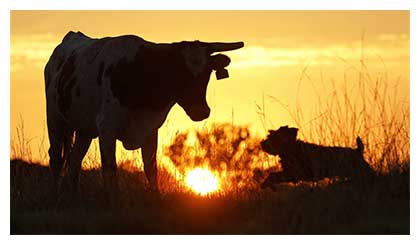
This week, as world leaders meet to hammer out a deal to reduce the greenhouses gases (GHGs) responsible for warming our planet, a major source of those gases is unlikely to make a significant appearance onto the agenda: meat.
"As families reach higher incomes, one of the first things they do is include more nutrient rich foods like beef in their diet," says Kim Stackhouse–Lawson, executive director of global sustainability at the National Cattlemen's Beef Association. That's why, she says, organizations like the Global Roundtable on Sustainable Beef are so important, as they allow countries to share their best practices.
Dateline: 12/07/15, Source: The Cattle Site
McDonald's knows that where food comes from is extremely important to consumers. And they know that people love beef. Larry Stewart, McDonald's senior director, global supply chain for beef, pork and fish and GRSB Executive Committee member.
"They love hamburgers, and they like to come to McDonald's to get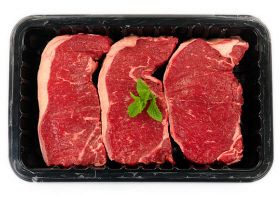 them. And what we also know is that in some cases they don't feel good about eating beef," said Larry Stewart, senior director, global supply chain for beef, pork and fish with McDonald's. "And we feel that's an important perception to change." them. And what we also know is that in some cases they don't feel good about eating beef," said Larry Stewart, senior director, global supply chain for beef, pork and fish with McDonald's. "And we feel that's an important perception to change."
In McDonald's view, the Global Roundtable for Sustainable Beef (GRSB) is a way to do just that and is one of the reasons they became stakeholders to support what the GRSB is doing at the global and national levels. "We want to give people every reason to come into McDonald's and enjoy a hamburger," Mr Stewart said.
Dateline: 12/07/15, Source: By Bryan Weech, BEEF Magazine
At its core, sustainability is not a new issue for the beef industry. Beef Quality Assurance (BQA) and Integrated Resource Management (IRM) are approaches to management that leading producers have used for years. What is new, however, is that when we talk about sustainability, not only are BQA and IRM important considerations, but so are things like resource use efficiency; the effect of management decisions on the environment; resiliency to extreme weather such as drought; food waste; rangeland and pasture health; financial soundness; quality of life of farmers and ranchers as well as community vibrancy and the impact on society of producing a wholesome source of nutrition.
Dateline: 11/30/15, Source: Feedstuffs
The Genome Analysis Centre (TGAC) in collaboration with the Institute of Biological, Environmental & Rural Sciences (IBERS) at Aberystwyth University, has sequenced and assembled the DNA of red clover to help breeders improve the beneficial traits of this important forage crop. The genome is published in Scientific Reports, a journal from the Nature publishing group.
Before industrial nitrogen fertilizer production, red clover and other legume crops were essential in crop rotation for improving soil fertility. Legumes boost soil nitrate fertility by assimilating nitrogen from the air, recruiting soil bacteria to help — this is considerably more eco–friendly than the equivalent industrial process.
Indeed, environmental concerns and climate change mitigation is putting red clover back in the spotlight.
Dateline: 12/02/15, Source: By Ciaran Moran, AgriLand
Recent remarks by environmental commentators that Ireland's beef herd should be replaced with trees has been dismissed as "nonsense ideology that will increase international greenhouse gas emissions, wipe out the livelihoods of 95,000 beef farmers, and lead to thousands of job losses," by Harold Kingston, the IFA's Environment Chairman. 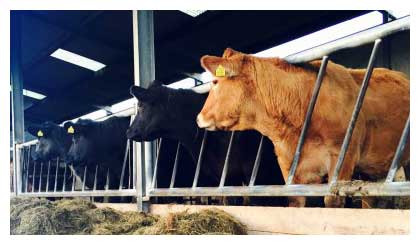
Kingston who is attending key climate change talks in Paris this week has said Ireland is a world leader in sustainable food production and this is independently verified by Carbon Trust UK, Bord Bia and Teagasc.
"It is unacceptable that these facts are ignored by environmental commentators, who would rather develop some nationally less environmentally sustainable policy of replacing beef with trees.
Dateline: 12/01/15, Source: PBS Learning Media
See how beef producers are thinking about the impact of cattle on the climate with this video and educational resources from PBS NewsHour from December 1, 2015. See Video HERE. 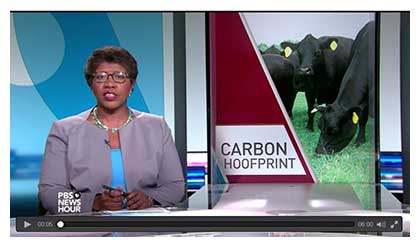
Dateline: 12/03/15, Source: Feedstuffs
The International Feed Industry Federation (IFIF) announced Nov. 3 that it is working with its members from around the world as well as international organizations, agri–food chain partners and other key stakeholders on a number of strategic initiatives to measure, benchmark and reduce the greenhouse gas (GHG) emissions impact of livestock production globally.
As world leaders seek agreement at the U.N. conference on Climate Change (COP21/CMP11) in Paris, France, IFIF said it continues to collaborate with stakeholders on the agri–food chain to strengthen sustainable food production to help contribute to dietary quality and nutrient adequacy around the world through the provision of safe, affordable, nutritious and sustainable feed and food.
Dateline: 12/11/15, Source: By Candace Krebs, La Junta Tribune
Sustainability goes beyond environmental considerations to include long–term economic viability and the successful transfer of family businesses from one generation to the next, according to presenters at the Colorado Ag Classic earlier this week in Loveland. The Ag Classic is the joint annual convention of the state's corn, wheat, sorghum and sunflower commodity groups.
Several farmers admitted, while timely, sustainability is a topic they love to hate. "It's kind of a choking word," said Randy Traxler, the Colorado Association of Wheat Growers president from Otis. "When you say it, it catches in your throat a little bit." For one thing, the term feels like an affront to farmers who in many cases are operating multi–generation farms.
"It would be easier not to be so defensive if we actually got some credit for what we do," said Mark Linnebur, of Byers, another former Wheat Growers president.
Dateline: 12/02/15, Source: By Mihai Andrei, ZME Science
Climate change and agriculture are so strongly intertwined that you basically can't talk about addressing climate change without bringing agriculture into the mix. At COP21, the climate summit in Paris,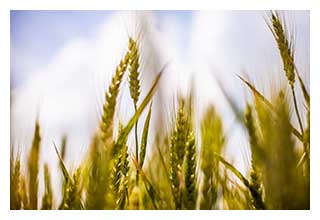 governments, NGOs and private entities joined hands to announce several initiatives focusing on some of the most pressing issues in agriculture: soils, the livestock sector, food losses, waste, sustainable production methods and resilience of farmers. governments, NGOs and private entities joined hands to announce several initiatives focusing on some of the most pressing issues in agriculture: soils, the livestock sector, food losses, waste, sustainable production methods and resilience of farmers.
Dateline: 12/14/15, Source: By Marty McCarthy, ABC Rural, AU
Australian cattle do not produce as much carbon emissions as first thought, and an adjustment to the figure could decrease the rural sector's overall contribution to greenhouse gas emissions.
That is the finding of an eight-year CSIRO investigation into the effects of the beef and dairy industries on Australia's methane emissions. According to Dr Ed Charmley, an agriculture scientist with the CSIRO, methane emissions from cattle in Australia are 24 per cent lower than previously thought, equivalent to 12.6 million tonnes of carbon dioxide a year.
Dr Charmley said the findings would help reduce criticism of the farm sector's impact on climate change, and help farmers increase their productivity.
Dateline: 12/11/15, Source: The Guardian
The potential of extensive livestock systems in African drylands is a topic buzzing in and around the United Nations climate change conference in Paris – COP21. Livestock trade driven by pastoralism in the Horn of Africa is worth some £660m annually, in Burkina Faso and Mali at least £120m annually and in Kenya, livestock accounts for about 10% of GDP and about 42% of agricultural GDP.
Livestock losses during the 2011 drought in Kenya caused an average growth reduction of 2.8% each year from 2008-2011. If pastoralists – livestock herders – had been able to sell their livestock or access forage and water to keep them alive, these losses could have been avoided and emergency aid reduced in the order of £260 savings for every 66p spent on reducing the quantity of stock held - a clear investment case for the public and private sectors alike.
Our Members

|
To read the entire source article, click on the link in the headline.
Welcome to the Table!
We Welcome The Newest Member to the Roundtable
Dateline: December 2015
Constituency: Civil Society
Ranchers Stewardship Alliance Inc. (RSAI) is a non–profit group whose supporters manage over 200,000 acres of natural grassland that supports a minimum of 10 species listed under federal species at risk legislation, many of which migrate across North America and are also at risk in the United States and Mexico.
RSAI's goal is to ensure that future agrienvironmental and biodiversity programs dealing with native rangelands are designed to positively reward the producers whose management practices provide the habitat and species society values.
Members In The News
Dateline: 11/30/15, Source: By Bill Berry, The Cap Times
Heading into the Global Climate Summit in Paris this week, climate denial and misinformation is still a big business. But it may be steamrolled by an even bigger one — sustainability activities among some of America's biggest food suppliers and other companies.
Companies like General Mills, Land O' Lakes, Kellogg and McDonald's, to name just a few among many, are actively implementing sustainability measures. To be successful, they can't look only at their own footprints, but need to reach all the way down to the soil where their products are grown and on up the supply chain.
Dateline: 12/04/15, Source: By Al Franken and Dave MacLennan, Minneapolis Star Tribune
One of us is a U.S. senator. One of us is the CEO of Cargill, the nation's largest privately held corporation. But we're both citizens who share a deep concern about the impact climate change is beginning to have on our way of life, and a deep commitment to doing our part to address this challenge before it's too late.
The challenge is complex but very real.
Two months ago, we experienced the warmest October ever recorded, and 2015 will go down as easily the hottest year on record. Climate change is already shrinking glaciers, acidifying oceans and altering weather patterns. But there's another element of the danger posed by climate change: the damage it could do to our food supply.
As a senator representing a farm state and as the CEO of a company focused on agriculture, we are particularly concerned about changes in weather patterns, temperature and rainfall, trends that will make farming — and thus food security — even more challenging around the world.
Dateline: 12/09/15, Source: BEEF Magazine
In the "old school" of cattle handling, there's lots of activity and movement by both the cattle handlers and the cattle. And by the end of the day, both the cattle handlers and the cattle are worn out. That, according to leading experts in livestock handling, isn't a good thing all the way around.
It doesn't have to be that way. Stockmanship is critical to the health and well–being of cattle and ultimately, the success of an operation. This means producers must continually put an emphasis on enhancing these vital skills and reiterating their importance to everyone who works with the animals.
Merck Animal Health is committed to supporting cattlemen in their efforts to make continuous improvements through its CreatingConnections™ Educational Series. The second module is now available HERE, and features leading cattle–handling experts who provide valuable insights on achieving excellent feedlot stockmanship.
Dateline: 12/10/15, Source: By Tom Polansek, Reuters
The FDA in 2013 released voluntary guidelines for drug makers and agricultural companies to phase out antibiotic use as a growth enhancer in livestock. The agency said the antibiotics could still be used to treat illnesses in animals raised for meat, but should otherwise be pared back by December 2016 under a program to keep them out of the human food supply.
"Sales does not equal use and use is not the same thing as resistance," said Ron Phillips, spokesman for the Animal Health Institute, which represents drug companies including Zoetis, Merck Animal Health and Eli Lilly and Co's Elanco Animal Health.
"FDA also tracks resistance pathogens in humans, animals and meats," he said, "and those trends have been largely encouraging."
Dateline: 12/02/15, Source: Trust.org
Global Communities, Solidaridad, and Participatory Development Associates (PDA) announced their partnership today with The MasterCard Foundation on an innovative employment initiative called "Youth Forward" for Ghana. The program assists economically disadvantaged young people to overcome barriers such as lack of formal employment, low levels of education, skills mismatches, and lack of access to credit by improving their ability to find quality jobs, access finance, start and grow businesses, and generally expand the opportunities available to them.
Global News
Dateline: 12/01/15, Source: By Terry Sim, BEEF Central
Australia'S new pain relief technology for the castration of lambs and calves – Numnuts – needs a commercial partner to help fund its $1million commercialisation price tag. The new Numnuts technology will be ready for on–farm use in 18–24 months and industry funding is available for commercialisation.
Dateline: Soil Project Seeks to Soak Up Excess Carbon
France is leading a worldwide push to increase the amount of carbon locked in soils through better farming practices.
Supporters of an initiative launched at the COP 21 summit say this would limit global warming by removing carbon from the atmosphere, while also increasing the range and amount of food farmers produce by improving soil fertility. This would particularly benefit developing countries, according to representatives of the 4 Pour 1000 initiative.
Dateline: 2/12/15, Source: By Lenore Taylor, Fiona Harvey and Adam Vaughan, The Guardian
The Paris climate deal is an "opportunity to change the world", François Hollande has said as he urged negotiators at the UN talks to adopt the final text of an agreement that will provide powerful momentum to efforts to curb climate change. The French president said: "We have to take that last step; the step that would enable us to reach our goal. And this would be a decisive step."
The wording, which has been haggled over by politicians and officials during two weeks of intensive talks, embeds promises from 185 countries to reduce emissions – sufficient to limit warming to somewhere between 2.7C and 3.7C above pre–industrial levels.
Dateline: 12/07/15, Source: Pulse
Yara is present at the UN Climate Summit in Paris between November 30 – December 11 to highlight the role of agriculture in tackling climate change.
A quarter of all greenhouse gas emissions can be attributed to agriculture. It is therefore important to recognize the huge potential for reducing these emissions through better land use and more sustainable intensification of farming.
From Paris, Yara's President and CEO Svein Tore Holsether, confirms the company's commitment to support farmers and the food industry in achieving the ambitious goals set by the World Business Council for Sustainable Development on December 1, aiming to produce 50 percent more food whilst reducing agricultural and land –use change emissions by at least 50 percent by 2030.
News We Can Use
If you have news to share with the Global Roundtable for Sustainable Beef membership, please send it to polly.welden@grsbeef.org
|

